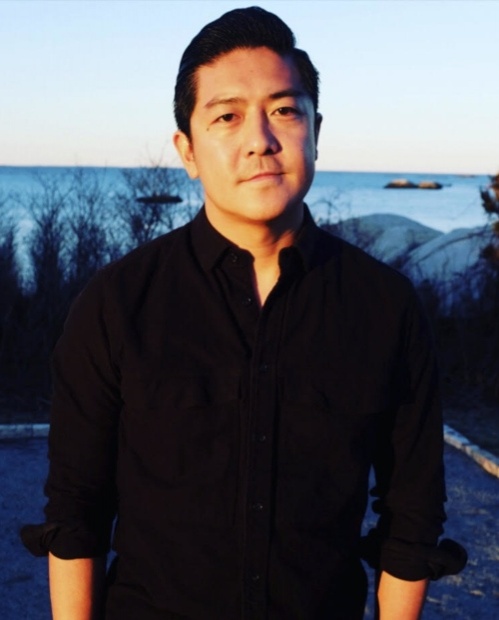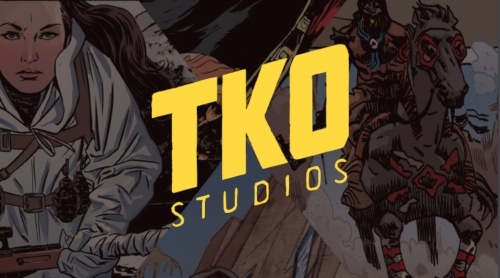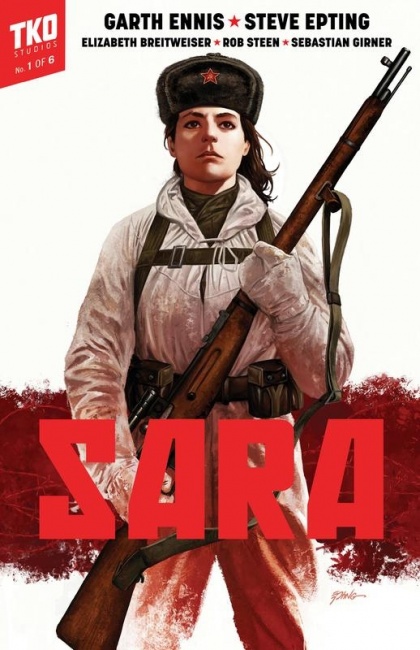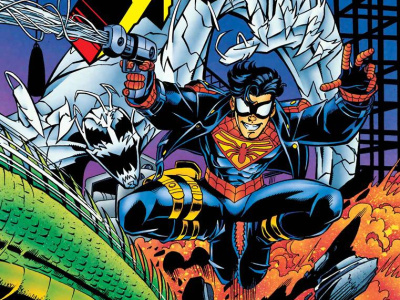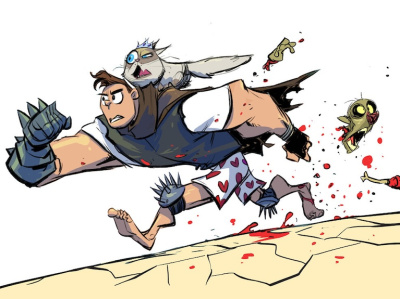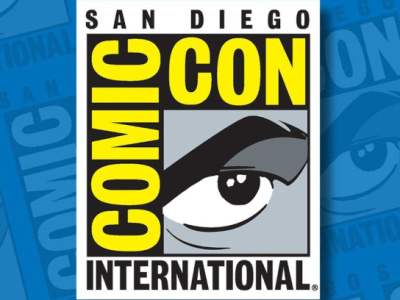TKO Studios launched late last year with four action-oriented comics by top-name creators, joining a crowded field of new entrants into the publishing arena, all targeting the same mature, non-superhero genre fans, primarily through comic shops. TKO has its own twist on the formula: series released all at once for binge-reading, simultaneously as slipcased single issues, trade paperback or digital collection, with first issues of each title free on digital. TKO has also bypassed Diamond, giving retailers the ability to order direct through the company’s website on terms designed to reduce risk and build readership.
TKO was co-founded by tech entrepreneur Salvatore Simeone and television writer/producer Tze Chun (Gotham), with Sebastian Girner serving as editor-in-chief. The company’s first salvo of titles includes Sara, a gritty war story set on the Russian front of World War II from Garth Ennis and Steve Epting; The 7 Deadly Sins, a suspense-horror story by Chun and artist Artyum Trakhanov; Goodnight Paradise, a crime-mystery by Joshua Dysart and Alberto Ponticelli; and The Fearsome Doctor Fang, a pulp action-adventure saga by Chun, Mike Weiss and Dan McDaid. Six-issue story arcs are priced at $14.99 for the bundle, trade or digital collection.
I had a chance to catch up with co-founder and co-publisher Tze Chun to talk about his vision for the company and his unusual distribution strategy. Our conversation has been edited for length and clarity.
Rob Salkowitz, ICv2: How did you get mixed up in this whole comics racket?
Tze Chun, TKO Studios: Comics were my first love. Growing up, I always wanted to be a comic book artist/writer. Then I got into indie film and realized that you get to pick one of these things, so I chose film. I wrote and directed a short film, then a feature at Sundance. By the early 2010s, I saw how TV was changing and getting exciting. Since 2012, I’ve been doing TV, writing and producing, also directing.
But I really missed comics. At one point, I went into House of Secrets, a comic shop in Burbank, to see what was going on, after being out of comics for a few years. Seeing the books on the shelf, the customers in the store… I felt like there was a vibrancy and excitement that I hadn’t seen. I can’t believe I lived long enough for comics to become cool!
How did the company come about?
I knew Sal [co-publisher Salvatore Simeone] for a long time. He’s a friend and mentor. A couple years ago we reconnected. He’s launched a bunch of companies and industries, so I always admired his mind for business. He wanted to do something in film and TV, but I told him investing in movies was a great way to lose lots of money.
Meanwhile I was looking at ways to get back into comics. I approached Sal with an idea and we decided to do it. Our goal was to create a new kind of publisher that did everything different.
So what’s different?
Well, first, the binge-release strategy, to put the whole story out there at once instead of making people wait for month after month. We figured, if we’re doing that, then why not make it easy to read the books in whatever format people want? That became box sets, trades, and digital all at the same time. The last component is the free first issues. Then there’s the bigger picture thing – going around Diamond to sell direct to fans and comic stores.
How do you get around Diamond?
We do deals with individual stores, through our website. We offer a 50% wholesaler discount, with no minimum order. We pay for shipping within the U.S. It’s straightforward. We want to make sure stores are in control of the ordering process. We say, stock as many books as you can sell. With our ordering system, you’ll get books in 2-5 days, so you don’t have to over order. Then when they sell out, you can get books again quickly. We launched 7 weeks ago, have gotten 4x reorders from some stores. Stores are encouraged to post photos of our books on their shelves, which we retweet and repost. You’re up in Seattle, right? [Seattle retailer] Comics Dungeon has been one of our earliest supporters.
Right. I’ve seen the books there, and the manager showed me Sara because he knows I’m a Garth Ennis fan. So, are the books returnable?
No, but that hasn’t been a problem.
Do you have additional financial backers?
No, it’s just us.
You’ve got some pretty interesting creators onboard for the launch. What attracted you to them and vice versa?
There are some big names. These were all creators that I loved as a fan. I just admired and loved their work. If we were going to do this, I wanted to find the people whose work I liked the best.
In terms of why they came to us, one thing we kept encountering is that people are in comics for the love, not the money. Creators wanted someone to try something new in comics. No one had done it to this degree. No one has looked at the entire industry and said how could we do it differently?
What’s the brand personality of TKO? Is there a particular kind of story you want to tell on the imprint?
We want to publish books that are new takes on established genres – sci-fi, action, fantasy, horror, but with an inversion of genre expectations. We feature different protagonists. Dr. Fong is a pulp action-adventure that tries to turn the [racist 1920s-30s trope] "yellow peril" on its head. In Goodnight Paradise, the detective is a homeless man. Sara is a macho war story featuring a corps of female snipers. The most important thing beyond the genre element is that everything be character-driven, with a beating heart behind it, so it’s not just the genre bones of a story, but introducing readers to characters that you really want to experience worlds through.
We don’t publish superhero comics. I grew up reading them. We all love them but early on, we made a decision not to do that. That market is well served by the Big Two and smaller publishers.
Are these creator owned titles?
No. We tried to create a deal that would take the best of both worlds. We match or beat Marvel or DC rates, and creators have a significant back end. For production folks like letterers and colorists, we up their rate to be what it would be if they had back-end participation. And that extends across all media.
The non-superhero genre space seems pretty crowded right now. How do you plan to either expand the market or win over readers of similar work?
We don’t think of it as competition. There’s a tendency in the industry to think in terms of market share, of slices of the pie. Well, who says the pie is one size? One reason we’re doing our distribution plan with binge reading is to expand the comic book market. Box sets, for example, reduce barrier to entry. For folks interested in comics, individual issues are hard to manage. The slipcase gives you a place to put the comics on the shelf, beside your other books.
Your comics are larger than standard (taller, wider). Why is your form factor different?
We wanted to place ourselves on the high end. We weren’t bound to a certain size and format. It’s still the same aspect ratio. I love the artwork and the extra inch and a half makes a difference.
Why do the bundles? Why not just trades?
We looked at it within the core of the company. Some people are diehard comic book fans. Some are trade readers, some are digital. I think there’s something interesting about the individual issues. We want to service those with the collector mentality, who like the individual issues. Sales have been split down the middle. I’m glad we did both.
Regarding digital, are you going through distribution channels like Amazon/comiXology, or are they just downloadable through your site?
ComiXology is approving the files now. We should be on in next two weeks.
How about the trade book channel? That’s where all the growth is right now.
We’re still trying to figure out the trade market. We’re on Amazon. Honestly, we focused so much on comic store market for launch, we want to make sure that’s solid.
What kind of reactions have you seen so far?
It’s been really positive. We launched in a different way. We didn’t do exclusives or deals with sites. We launched off Twitter. We wanted to reach fans directly. So we just created a thread on Twitter to explain who we are, introduce ourselves to fans. We thought of it as a soft launch and it took off quickly.
Can you give an idea of your sales so far?
No, I’m sorry, we don’t talk about that.
Are you looking at bigger media deals?
I mean, it’s always a part of the business plan. I’m from that world. I’m aware every comic gets optioned at some point. Right now we’re just focused on the comic book space.
Can you sustain this publishing cadence of four story arcs worth of content a couple of times per year?
We launched the four titles first. We’ll be launching four more titles in Spring/Summer. The books are already listed on our site. Some titles are meant to be continuing. If they succeed, we want a second arc.
Great, thanks for your time. Will people be able to find you at any upcoming conventions?
Yes, we’ll be at Emerald City Comic Con and C2E2 next month.
The opinions expressed in this column are solely those of the writer, and do not necessarily reflect the views of the editorial staff of ICv2.com.
Rob Salkowitz (@robsalk) is the author of Comic-Con and the Business of Pop Culture.
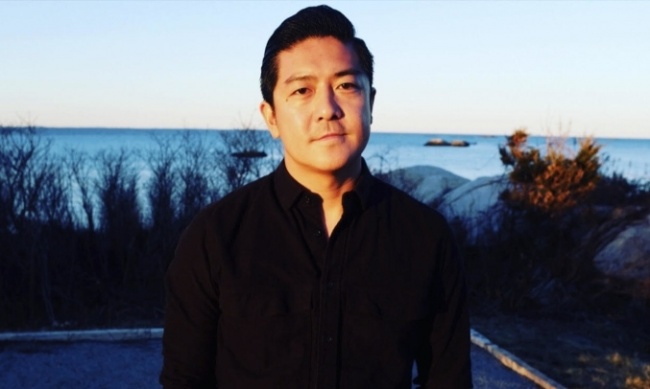
Column by Rob Salkowitz
Posted by Rob Salkowitz on February 5, 2019 @ 11:32 pm CT
MORE COMICS
Part of 1996 Marvel/DC Crossover
August 1, 2025
Writer Karl Kesel and artist Mike Wieringo are the creative team for the one-shot comic, which was first published in 1996 in the middle of a Marvel/DC crossover.
Crowdfunding Campaign Launches in October, Followed by Retail Release
August 1, 2025
Vault will crowdfund the graphic novel on the Backerkit platform in October, then release it to retail.
MORE COLUMNS
Column by Scott Thorne
July 28, 2025
This week, columnist Scott Thorne comments on the Edge of Eternities prerelease and on Magic: The Gathering news from the Hasbro earnings report.
Column by Rob Salkowitz
July 21, 2025
Columnist Rob Salkowitz lays out the Comic-Con panels of interest to industry professionals, current and aspiring creatives, educators, librarians and retailers.




